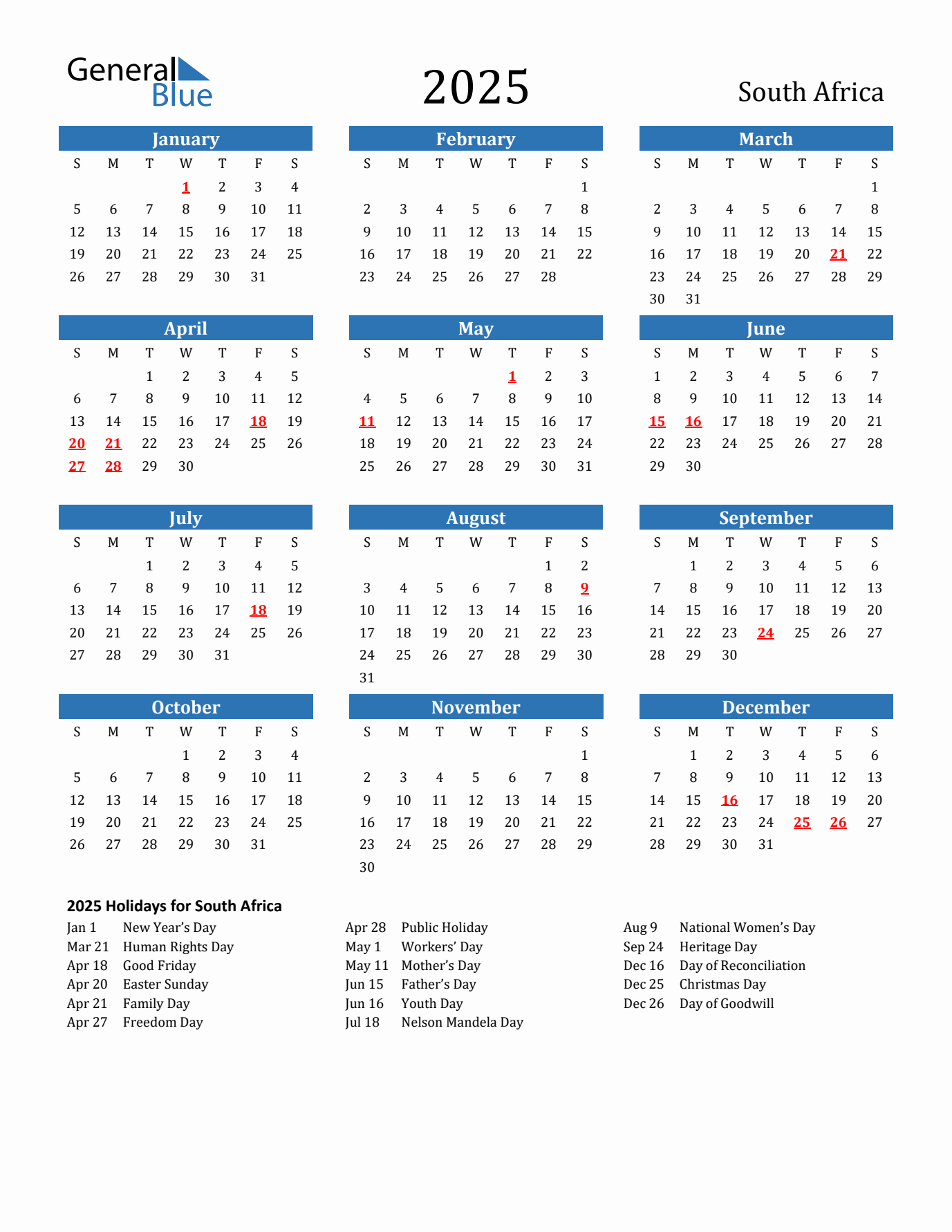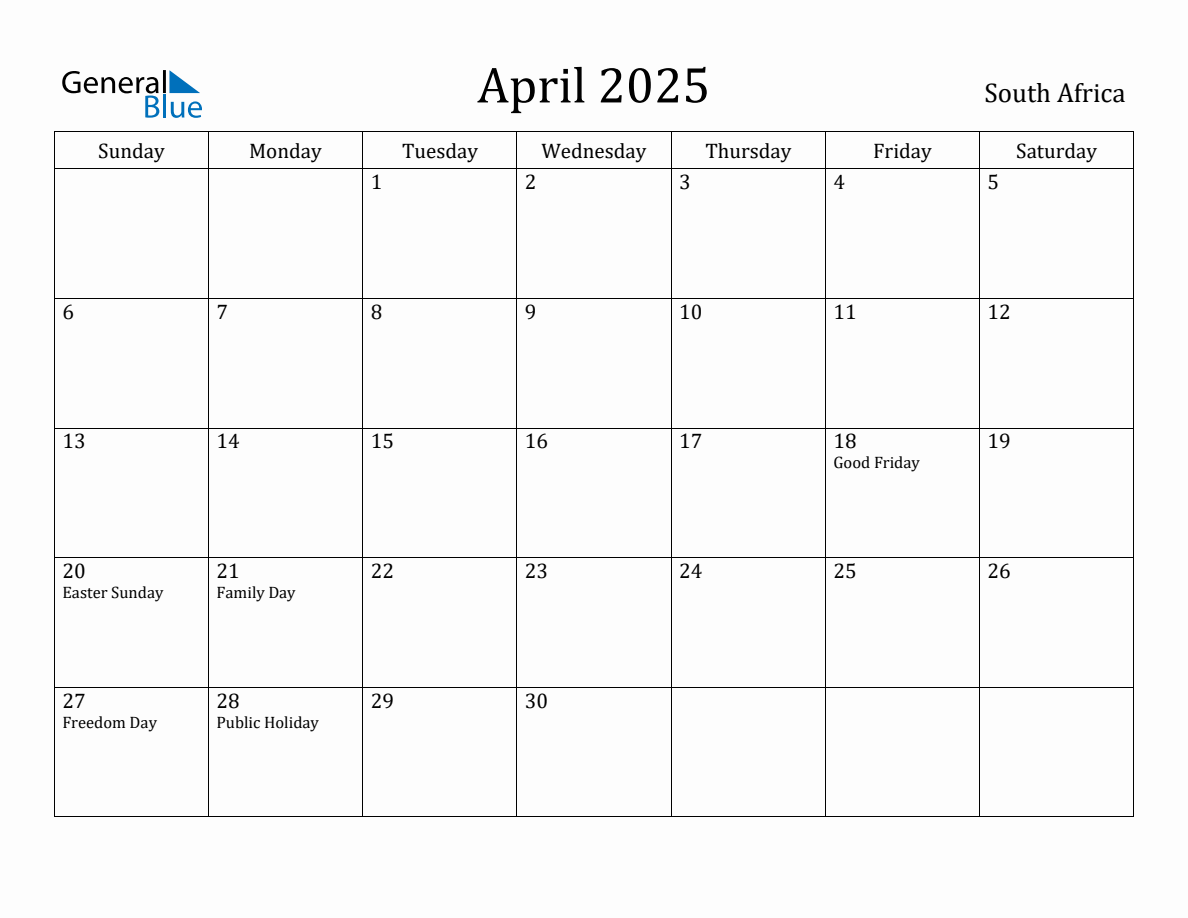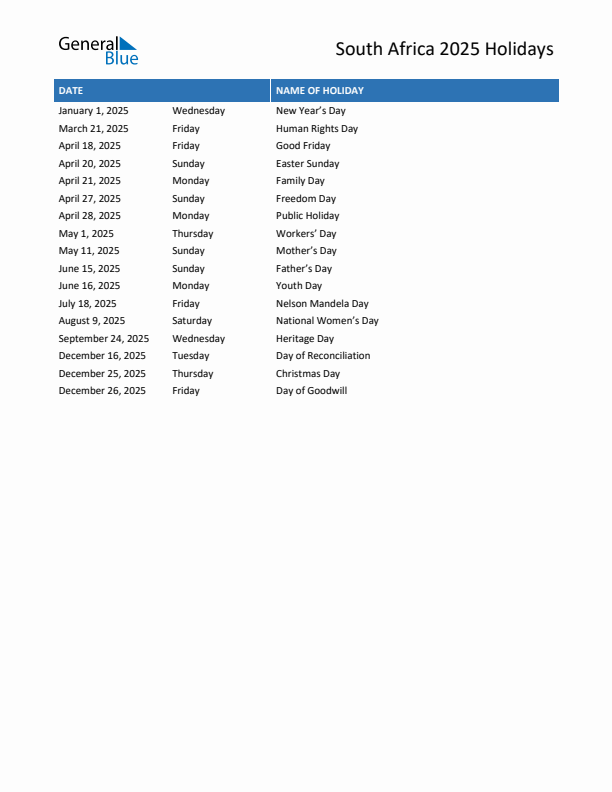National Women's Day in South Africa
When is National Women's Day in South Africa?
National Women's Day in South Africa is on August 9, 2025. It falls on Saturday.
How many days until National Women's Day in South Africa?
There are 113 Days left until National Women's Day in South Africa.
Is National Women's Day a public holiday in South Africa?
A day meant to celebrate women’s strength and contribution to the society is called Women’s Day. In South Africa, it is declared as a public holiday which is officially called National Women’s Day and is celebrated every year.
The holiday is observed to commemorate the event where thousands of South African women from various ethnicities, protested against the Pass Laws implemented during the Apartheid era. This protest took place on August 9, 1956, which is primarily the reason why the South Africans observed this holiday on the 9th of August each year.
National Women's Day Origin in South Africa
The country’s National Women’s Day originated from the event which happened on the 9th of August 1956. On that day, more than 20,000 South African women from various races have peacefully marched to the Union Buildings in Pretoria (which houses the executive government), to protest against the Pass Laws implemented by the Apartheid leaders. Apartheid is a government system instituted in South Africa from 1948 – 1994, where a segregation in the society was made based on race. During this era, the black South Africans which consist most of the country’s population, suffered the most. The black majority have experienced countless injustices and discrimination. Pass Laws is an example of such injustice, which require the black South Africans to carry a passport/passbook anywhere they go.
What are Pass Laws in South Africa?
Pass Laws in South Africa is considered by many as one of the most despised acts under Apartheid era. Under Pass Laws Act of 1952, black South Africans above 16 must carry a passbook which is colloquially called “dompas” wherever they go. Dompas are like domestic passport except that it contains more information about the person such as the personal details of employment, government permission to be in a particular part of country, photograph, fingerprint, work qualifications, among others. These ‘pass laws’ were implemented to restrict the black people’s movements. Failure to bring these passbooks means the black people cannot access/enter the so-called white areas. Because of such discrimination, many South Africans went on several protests. The protest which occurred on August 9, 1956 is one example. This protest was led by Lillian Ngoyi, Helen Joseph, Sophia Williams, and Rahima Moosa, and was joined by thousands of other South African women from all races.
When was National Women’s Day first celebrated?
When Nelson Mandela won South Africa’s first democratic national election in 1994, it marked the total abolition of the Apartheid system. Not long after Mandela took the Presidential office, the National Women’s Day was introduced to the country. By August 9th, 1995, the holiday was observed for the first time by the South Africans.
National Women's Day Practices in South Africa
In South Africa, an important holiday called National Women’s Day is celebrated every year. The day was observed to commemorate the 1956 march done by thousands of South African women who were brave enough to fight for what they think is right. This fight for equality of rights on August 9th, 1956 has become the country’s foundation to continue the battle for equality and women’s rights at present.
Since National Women’s Day is a public holiday, its observance also means closure for a lot of establishments in South Africa. Public offices as well as schools and universities close. The same goes for many business organizations. While there are some stores, shops, shopping malls, restaurants, and other businesses which remain open, most of the offices would close and employees are given a day off on this day.
How is National Women’s Day celebrated?
August is considered as Women’s Month in South Africa, and Women’s Day, held on the 9th of August, is an important part of the month. For the South Africans, Women’s Day is the perfect day to raise awareness regarding concerns which are women related. Issues such as inequality of pay, domestic violence, discrimination, sexual harassment (in the workplace and other places), and education for girls, are examples of issues which South African women are still facing today. Thus, on Women’s Day, many organizations promoting the welfare of the country’s female population, use the day as an opportunity to call for women’s rights and equality.
Women related events
Various women related events are arranged on this day, and not only the women are encouraged to participate, but the country’s population in general. Local government offices throughout South Africa are typically the ones to organize this type of events. Public lectures and speeches are examples of these activities. These speeches are usually done by the important figures in the government, as well as speakers from both the local and private organizations. The speakers would discuss several things including labor concerns and other relevant issues which South African girls and women are still battling for as of the present.
Presidential Speech
The Presidential speech has also become an integral part in the celebration of Women’s Day in South Africa. Every year, the President will address the nation about the importance of the holiday as well as the importance of women empowerment in building a better and progressive country. Reenactments of the 1956 march is also televised in the country so people can watch it and better appreciate the role played by the women in the fight against the Apartheid system. Aside from this, other activities like ‘free physical examinations for women’ are also organized by numerous medical facilities to celebrate the day.
Importance of National Women’s Day
Nowadays, this holiday is not only observed to pay homage for all courageous women who fought in the past, but also to celebrate the women’s contribution to the society and the country. Because of the holiday’s establishment, South African women have better social positions today as compared to the former years. The holiday had led to significant changes in terms of advancement of the women’s rights. This advancement includes the girls and women’s access to education, access to better health care, and their freedom to participate in the country’s economy-related decision-making.
| Year | Date | Day | Holiday |
|---|---|---|---|
| 2025 | August 09 | Saturday | National Women's Day |
| 2026 | August 09 | Sunday | National Women's Day |
| 2027 | August 09 | Monday | National Women's Day |
| 2028 | August 09 | Wednesday | National Women's Day |
| 2029 | August 09 | Thursday | National Women's Day |
| 2030 | August 09 | Friday | National Women's Day |
| Holiday | Date |
|---|---|
| Good Friday | April 18, 2025 |
| Easter Sunday | April 20, 2025 |
| Family Day | April 21, 2025 |
Download or print free 2025 calendar which includes the list of holidays in United States. Free holiday calendar templates in more than 130 countries are provided in PDF, Excel, and Microsoft Word format. For those who like to get a calendar that starts on Monday, we also have ISO calendar.
The April 2025 monthly calendar for the United States shows the holidays for the month, which is helpful in planning schedule and events in reference to the upcoming holidays in the US. It is available in PDF, Microsoft Word and Microsoft Excel formats. You may select your preferred orientation and preferred start of week since we have Monday start calendar or Sunday start calendar.
If you are looking for just a list of holidays in the United States for the year 2025, we have that available in PDF, Word and Excel formats. This can be helpful for those who like to keep track of the holidays, be it for travel, work or any other purposes. It is free to use, just like the rest of our templates. You can choose from Letter, Legal and A4 paper sizes.


